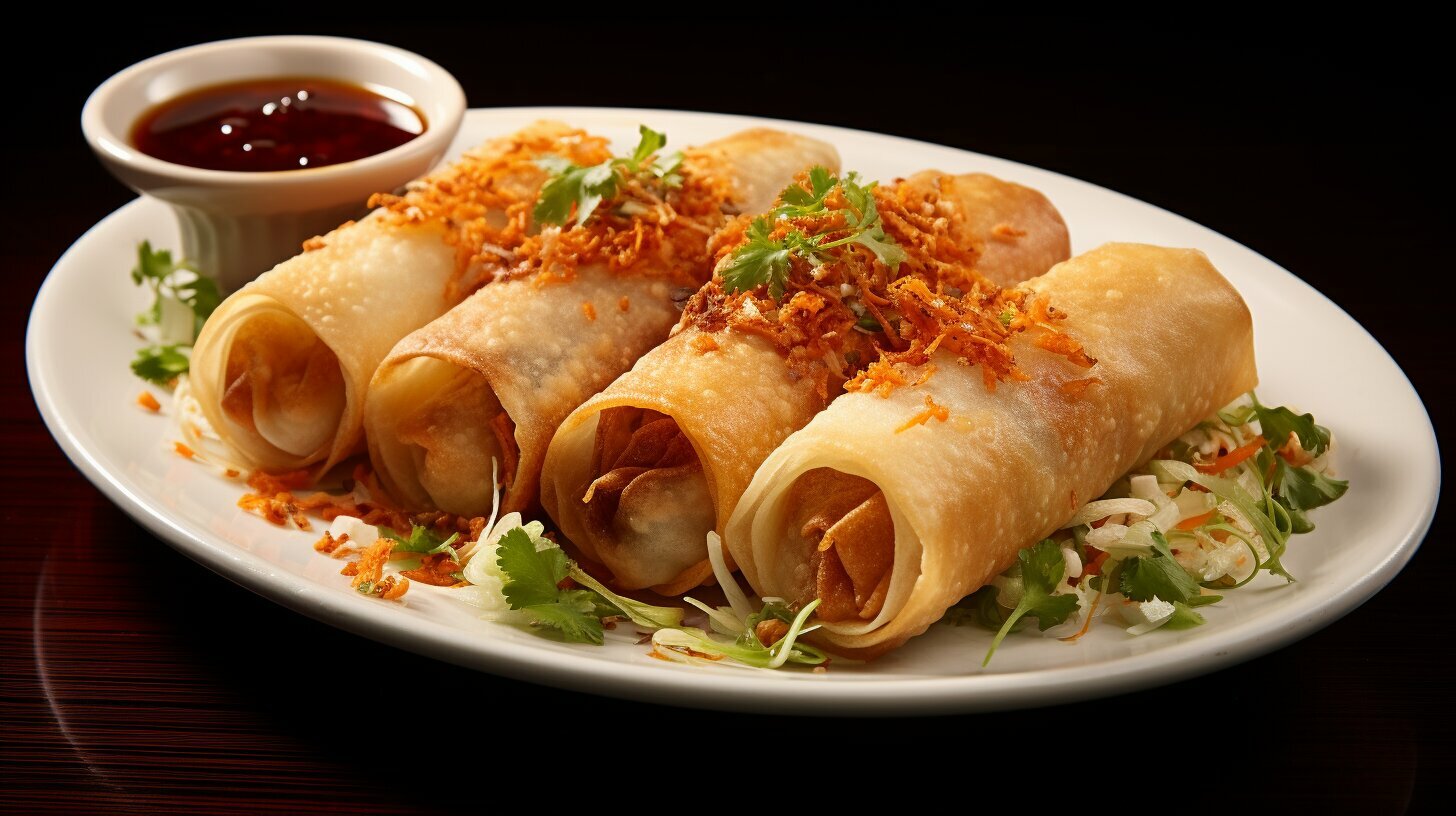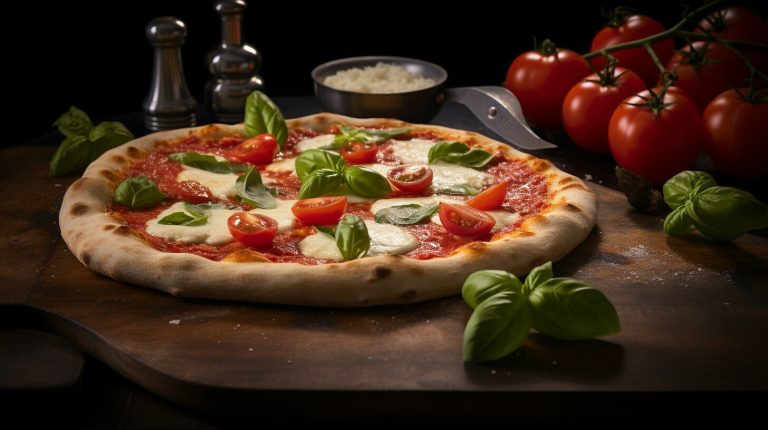Cracking the Riddle: Why are Egg Rolls Called Egg Rolls?
Have you ever wondered why these delectable delights are called egg rolls? Despite the name, there is no egg in the traditional recipe. The origin of the name remains a mystery, but there are a few theories that offer some insight into this culinary enigma.
One theory suggests that the name “egg rolls” may have emerged from a dish called “Dan Gun,” which was featured in a Chinese American Cookbook from 1917. This dish consisted of vegetables and meat wrapped in an egg and then sliced. Over time, the wrapper changed to dough, but the name may have stuck.
Another theory proposes that the name came from the use of eggs in the dough of the wrapper. While not all recipes use eggs, many variations do incorporate this ingredient, giving rise to the name “egg rolls.”
Despite the uncertainty surrounding their name, egg rolls have become a beloved Chinese-American dish. Similar to spring rolls, which are wrapped in thin rice paper, egg rolls offer a delightful combination of crispy exterior and flavorful fillings. They have also gained popularity in other countries, each with their own unique variations on wrapped vegetables and meat.
In Vietnam, there is Chả Giò, in the Philippines, there is Lumpia, in South Korea, there is Gyeran-mari, and in Malaysia, there is Popiah. These countries have their own take on this delicious snack, adding their own cultural flair to the concept of wrapped goodness.
So, whether you prefer egg rolls, spring rolls, or any of their international counterparts, there’s no denying the widespread love for these delectable delights. Despite the riddle behind their name, egg rolls have earned their place as a beloved snack enjoyed by people all over the world.
Key Takeaways:
- Despite the name, traditional egg rolls do not contain any egg.
- One theory suggests that the name “egg rolls” may have come from a dish mentioned in a Chinese American Cookbook from 1917 called “Dan Gun.”
- Another theory proposes that the name originated from the use of eggs in the dough of the wrapper.
- Egg rolls are a beloved Chinese-American dish similar to spring rolls, which are wrapped in thin rice paper.
- Other countries have their own variations of wrapped vegetables and meat, such as Chả Giò in Vietnam, Lumpia in the Philippines, Gyeran-mari in South Korea, and Popiah in Malaysia.
Theories and Speculations
Let’s dive into the intriguing theories and speculations surrounding the name of egg rolls. The origin of the name “egg rolls” is shrouded in mystery, with no definite answer. However, there are a couple of compelling theories that offer possible explanations.
One theory suggests that the name may have come from a dish called “Dan Gun,” mentioned in a Chinese American Cookbook from 1917. This dish involved wrapping vegetables and meat in an egg and then slicing it. Over time, the recipe evolved, with the egg being replaced by a dough wrapper. Despite the change in ingredients, the name may have stuck, leading to the common usage of “egg rolls.”
Another theory proposes that the name is derived from the use of eggs in the dough of the wrapper. While not all egg roll recipes include eggs, some do, which may have contributed to the name. The eggs could have been used to enhance the texture and binding properties of the dough, resulting in the name “egg rolls.”
The Meaning Behind the Name
The name “egg rolls” may be misleading, as it implies the presence of eggs in the dish. However, it is important to remember that names can sometimes be deceiving. In the case of egg rolls, the name has become synonymous with a popular Chinese-American dish, even though the true origin and meaning of the name remain uncertain.
Spring rolls, on the other hand, are wrapped in a thin rice paper wrapper and often have a lighter and fresher taste. The distinction between egg rolls and spring rolls lies in their wrappers, fillings, and cultural backgrounds. While egg rolls have become an iconic snack in the United States, they also have variations in other countries, such as Vietnam’s Chả Giò, the Philippines’ Lumpia, South Korea’s Gyeran-mari, and Malaysia’s Popiah.
In conclusion, the name “egg rolls” may not accurately reflect the ingredients or origins of the dish. However, this misnomer has not diminished the popularity of this beloved snack. Whether you enjoy them at a Chinese restaurant or make them at home, egg rolls continue to bring joy to people all over the world.
Chinese-American Cookbook Connection
Could the name “egg rolls” have its roots in a dish mentioned in a Chinese American Cookbook? It’s an interesting theory that suggests the name may have originated from a dish called “Dan Gun.” This dish, consisting of ingredients wrapped in an egg and sliced, was mentioned in a Chinese American Cookbook from 1917. While the dish itself has evolved over time and the wrapper changed to a dough, the name “egg rolls” may have stuck.
Theories and Speculations
The origin of the name “egg rolls” remains a mystery, but there are other theories and speculations worth exploring. Some believe that the name could be attributed to the use of eggs in the dough of the wrapper. Although not all recipes include eggs, this theory suggests that the presence of eggs in some variations influenced the name of the dish. While the exact truth behind the name may be elusive, one thing is clear – egg rolls have become a beloved Chinese-American snack enjoyed by many.
“The name “egg rolls” is a misnomer because there is no egg in the traditional recipe. Some recipes do use eggs in the wrapper, but many don’t.”
Egg rolls are often compared to spring rolls, which are wrapped in a thin rice paper wrapper. The distinction between the two is significant, as spring rolls are typically associated with fresh and lighter flavors, while egg rolls are heartier and more savory. Both dishes have their own unique cultural backgrounds and variations, but it is the name “egg rolls” that tends to lead to confusion. Despite the uncertainty surrounding the origin of the name, one thing is for sure – egg rolls have become a popular snack not only in the United States but also in countries around the world.
Egg Rolls Around the World
As I mentioned earlier, other countries have their own versions of wrapped vegetables and meat. In Vietnam, they have Chả Giò, a crispy and flavorful fried spring roll. The Philippines offers Lumpia, a dish with a variety of fillings wrapped in a thin wrapper. In South Korea, they have Gyeran-mari, which translates to “rolled eggs.” These rolled omelettes often feature vegetables and are served sliced. And in Malaysia, they have Popiah, which is a fresh spring roll filled with a variety of ingredients.
| Country | Wrapped Dish |
|---|---|
| Vietnam | Chả Giò |
| Philippines | Lumpia |
| South Korea | Gyeran-mari |
| Malaysia | Popiah |
These variations on wrapped vegetables and meat highlight the universality and popularity of this type of dish. Despite their different names and flavors, they all share the common idea of wrapping delicious fillings in a wrapper. So, whether you prefer egg rolls, spring rolls, or any of the other wrapped delights from around the world, there’s no denying the joy and satisfaction that comes from biting into one of these tasty treats.
The Egg in the Wrapper
Is it possible that the presence of eggs in the wrapper dough gave rise to the name “egg rolls”? While the name is a bit misleading, as traditional egg rolls don’t actually contain eggs, there are theories that suggest a connection.
One theory proposes that the name “egg rolls” originated from a Chinese American Cookbook published in 1917, which mentioned a dish called “Dan Gun.” This dish consisted of vegetables and meat wrapped in an egg and sliced. Over time, the recipe evolved and the egg wrapper was replaced with a dough wrapper. However, the name “egg rolls” may have stuck, even though the egg was no longer a prominent ingredient.
Another theory suggests that the name comes from the use of eggs in the dough. Some variations of egg rolls do include eggs in the wrapper, giving it a richer and more flavorful texture. The presence of eggs in the dough could have led to the name “egg rolls” to distinguish them from other types of wrapped dishes.
While the true origin of the name remains uncertain, what is clear is that egg rolls have become a beloved snack worldwide. Similar to spring rolls, which are wrapped in a thin rice paper wrapper, egg rolls have their own unique appeal. Other countries have their own variations of wrapped vegetables and meat, such as Vietnam’s Chả Giò, the Philippines’ Lumpia, South Korea’s Gyeran-mari, and Malaysia’s Popiah. These variations showcase the cultural diversity and creativity when it comes to wrapped dishes.
Egg Rolls vs. Spring Rolls: The Great Wrapper Debate
What sets egg rolls apart from spring rolls, and why are they called egg rolls instead? Let’s unravel the mystery and compare these two popular dishes.
Egg rolls and spring rolls may look similar, but their wrappers make all the difference. Egg rolls are typically wrapped in a thicker, dough-based wrapper, while spring rolls are wrapped in a thin rice paper wrapper. This variance in wrapping material gives egg rolls a crispier texture, thanks to the deep-frying process, while spring rolls tend to have a lighter, chewier texture.
Now, let’s address the elephant in the room: why the heck are they called “egg rolls” if there’s no egg involved? The name can be traced back to various theories and speculations. One possibility is that the name originated from a dish mentioned in a Chinese American Cookbook from 1917 called “Dan Gun,” which consisted of ingredients wrapped in an egg and sliced. Over time, the recipe evolved, and the egg was replaced with a dough-based wrapper. Another theory suggests that the name refers to the use of eggs in the dough itself, giving it a richer flavor and adding a touch of uniqueness to the dish.
While the origin of the name remains uncertain, what matters is that egg rolls have become a beloved snack not only in the United States but also in various cuisines around the world. Vietnam has their own version called Chả Giò, the Philippines has Lumpia, South Korea has Gyeran-mari, and Malaysia has Popiah. Each country puts its own spin on wrapped vegetables and meat, adding to the global appreciation for these delectable treats.
Egg Rolls Around the World
Egg rolls have captivated taste buds all around the world, let’s take a closer look at their global appeal. Despite their misleading name, egg rolls have become a beloved snack enjoyed in various cuisines and cultures. With a crispy exterior and a flavorful filling, these rolled treats offer a delightful combination of textures and tastes.
China
In China, the birthplace of egg rolls, this popular dish is known as “spring rolls.” Traditional Chinese spring rolls are wrapped in thin rice paper and often filled with a medley of vegetables, meat, and sometimes seafood. These delicate rolls are usually enjoyed during festivals or as part of a celebratory meal. However, the version commonly found in Chinese-American cuisine, known as egg rolls, typically features a thicker, deep-fried wrapper and a heartier filling.
Vietnam
In Vietnam, egg rolls are called “Chả Giò” and are a staple in Vietnamese cuisine. These crispy rolls are usually made with a rice paper wrapper and filled with a mixture of ground meat, vegetables, and noodles. Chả Giò is often enjoyed as an appetizer or as part of a larger meal. Accompanied by fresh herbs and dipped in a tangy fish sauce, these Vietnamese egg rolls offer a burst of flavors.
The Philippines
In the Philippines, egg rolls are known as “Lumpia” and are a beloved street food. Lumpia comes in various forms, with both fried and fresh versions. The traditional Filipino egg roll is typically filled with a combination of ground meat, vegetables, and sometimes shrimp. Served with a sweet and sour dipping sauce, Lumpia is a crowd-pleasing snack that can be enjoyed on its own or as part of a larger meal.
| Country | Egg Roll Name | Wrapper | Filling |
|---|---|---|---|
| China | Spring Rolls | Thin rice paper | Vegetables, meat, seafood |
| Vietnam | Chả Giò | Rice paper | Ground meat, vegetables, noodles |
| Philippines | Lumpia | Variety of wrappers | Ground meat, vegetables, shrimp |
Today, egg rolls have become a global phenomenon, with each culture embracing their own unique take on this delicious snack. Whether you’re savoring a Chinese-American egg roll, Vietnamese Chả Giò, or Filipino Lumpia, these rolled delights offer a satisfying culinary experience with every bite. So, the next time you indulge in an egg roll, take a moment to appreciate its rich history and the diverse flavors it represents.
Conclusion
In conclusion, the name “egg rolls” might still be a riddle, but their deliciousness knows no bounds. Despite the misnomer, which suggests the presence of eggs in the recipe when there often isn’t, egg rolls have become a beloved Chinese-American dish. While the origin of the name remains unclear, a couple of theories offer possible explanations.
One theory points to a dish called “Dan Gun” mentioned in a Chinese American Cookbook from 1917. This dish consisted of vegetables and meat wrapped in an egg and sliced. Although the wrapper has since changed to dough, the name “egg rolls” may have stuck, representing the original concept of food wrapped with eggs.
Another theory suggests that the name comes from the use of eggs in the dough of the wrapper. While it is true that some recipes include eggs in the wrapper, many variations do not. Regardless of the true origin, one thing is certain: egg rolls are a popular snack enjoyed by people of all backgrounds.
Similar to spring rolls, which are wrapped in thin rice paper, egg rolls have variations in other cuisines around the world. From Vietnam’s Chả Giò to the Philippines’ Lumpia, South Korea’s Gyeran-mari, and Malaysia’s Popiah, wrapped vegetables and meat are a culinary delight in various cultures. The name may differ, but the joy of biting into a crispy, savory roll remains the same.
FAQ
Why are egg rolls called egg rolls if there is no egg in the traditional recipe?
The name “egg rolls” is a misnomer because there is no egg in the traditional recipe. Some recipes do use eggs in the wrapper, but many don’t. The origin of the name is unclear, but there are a couple of theories.
What are the theories behind the name “egg rolls”?
One theory is that the name comes from a dish called “Dan Gun,” which was mentioned in a Chinese American Cookbook from 1917. Another theory is that the name comes from the egg used in the dough. Despite the uncertainty, egg rolls have become a popular Chinese-American dish.
Are egg rolls the same as spring rolls?
No, egg rolls and spring rolls are different. Spring rolls are wrapped in a thin rice paper wrapper, while egg rolls have a dough wrapper. The name “egg rolls” often leads to confusion, but they are distinct dishes with different wrappers, fillings, and cultural backgrounds.
Why are they called egg rolls instead of spring rolls?
The name “egg rolls” has stuck despite the confusion with spring rolls. It’s unclear why this name became popular, but it may be due to its early association with American-Chinese cuisine and the misnomer of using eggs in the wrapper.
Are egg rolls popular in other countries?
Yes, other countries have their own variations of wrapped vegetables and meat. Some examples include Vietnam’s Chả Giò, the Philippines’ Lumpia, South Korea’s Gyeran-mari, and Malaysia’s Popiah. Egg rolls have become a beloved snack enjoyed by people all over the world.
- Discovering Why Do Women Wear Lipstick: A Deeper Look - 19/12/2023
- Why Do Golfers Only Wear One Glove? - 16/12/2023
- Why Don’t Hobbits Wear Shoes? - 14/12/2023
Hi, I’m Rhiannon, the lead author behind The News Wire. As a passionate journalist, I strive to bring you the latest news and updates from all over the world. With a keen eye for detail and a dedication to unbiased reporting, I aim to deliver well-researched and informative articles that keep you informed and engaged. From breaking news to in-depth analyses, I cover a wide range of topics with the aim of keeping you in the loop. Join me on The News Wire as we explore the dynamic and ever-changing landscapes of global events, uncovering the stories that matter most.






